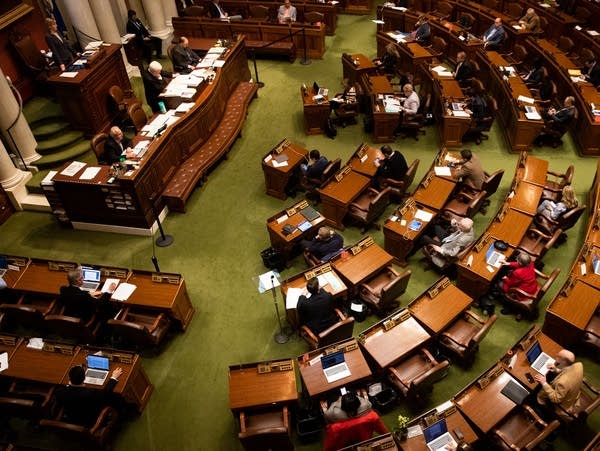Lawmakers dash toward finish — or just to special session

Go Deeper.
Create an account or log in to save stories.
Like this?
Thanks for liking this story! We have added it to a list of your favorite stories.
In any other year, the Legislature’s final week of session would be filled with late nights, lots of political jockeying and an urgency to complete any work before lawmakers switch to campaign mode.
But COVID-19 has upended the agenda and has stirred talk of a near-certain special session. The Capitol isn’t its usual hive of activity because of safety measures in place. And lawmakers expect to be called back to St. Paul in some fashion this summer, perhaps on a rolling or extended basis.
They’ve got to begin repairing the state budget. They might have to plow more money into coronavirus response efforts. They could be automatically summoned back to weigh in if DFL Gov. Tim Walz decides to tack a lot more time on his peacetime emergency declaration.
Walz faces several decisions this week on his peacetime emergency order that currently runs through Wednesday and on separate directives urging people to stay-at-home as much as possible and to keep bars, restaurants and amusement venues closed to all but to-go business. Those orders expire in a week.
Turn Up Your Support
MPR News helps you turn down the noise and build shared understanding. Turn up your support for this public resource and keep trusted journalism accessible to all.
On Friday, Walz said Minnesota remains in a precarious spot with case counts and deaths on the rise. He predicted that many customers aren’t ready to dine out or gather where there are crowds.
“To do this haphazard, and I think of business owners, if you open up and it becomes clear people got sick being there, it’s every bit as damaging as a stay-at-home order,” Walz said. “So we can’t get it wrong.”
The governor has encountered increasing resistance from Republicans in the Legislature and lawsuits from entities that have felt squeezed by the restrictions.
The tension has become a backdrop for legislative negotiations.
Republicans, who have the Senate majority, are moving several bills that would direct Walz to take steps toward reopening and to assert more authority over how coronavirus response spending is done.
After Monday, Walz won’t have the power to direct spending from a COVID-19 fund. The Democratic House is primed to give him more time, but it could be a bargaining chip.
Walz said he’s well aware it’s a two-way street.
“I would just hope they can find a compromise by Monday to continue that on,” he said.
As of Sunday, $65 million of an initial $200 million in a COVID-19 response fund had yet to be designated, but Minnesota Management and Budget Commissioner Myron Frans has said several requests were pending.
“We are working on a pandemic. We are working on saving lives. Buying PPE (personal protective equipment). Setting up alternative care sites. Buying storage facilities for deceased remains,” Frans said. “ So this is not an opportunity anyone would ever take undue license with.”
Lawmakers are expected to put more money into the fund, some of which can be offset with federal aid.
Rep. Pat Garofalo, R-Farmington, said there’s bipartisan agreement on that.
“We’re going to appropriate more money into this fund. This is not a battle, it’s a war,” he said. “So additional money will be going into this fund. It’s just a necessity.”
But he said there must be a way to “steer clear of a path where one person is making all of the decisions.”
The duration of an extension is part of the discussion. Democrats are ready to stretch the deadline for spending from the fund to June 2021; Republicans want it to be limited to weeks or months so Walz would have to keep them in the mix on key decisions.
The looming $2.4 billion budget deficit is another big factor. Bills that aren’t related to the coronavirus fight have been pushed to the side if they involve new spending.
One lingering flashpoint is a set of state employee contracts that await legislative ratification.
The House could vote Monday to endorse them, but Senate leaders say they should be reopened to peel back raises due to be awarded in July.


